- Having former Jazz teammate Mike Conley on his side again has helped Rudy Gobert settle into a groove with the Timberwolves, coach Chris Finch told Chris Hine of the Minneapolis Star Tribune (Twitter link). Gobert is averaging 17.7 points over the last six games. “I think you see it. The chemistry is obvious,” Finch said. “We could’ve played another 40 games (without Conley) and just begin to develop that. … I think Rudy has got a pep in his step.”
- Walker Kessler still faces an uphill climb for the Rookie of the Year award despite being named the Western Conference Rookie of the Month, Sarah Todd of the Deseret News notes. The Jazz rookie averaged 10.6 points, 11.4 rebounds and 3.2 blocks in February but the Magic’s Paolo Banchero remains the top candidate for the yearly award.
For the rest of the regular season and postseason, Hoops Rumors is taking a closer look at players who will be free agents or could become free agents during the 2023 offseason. We consider whether their stock is rising or falling due to their performance and other factors. Today, we’re focusing on a handful of Northwest players.
Jordan Clarkson, G, Jazz
- 2022/23: $13.34MM
- 2023/24: $14.26MM player option
- Stock: Up
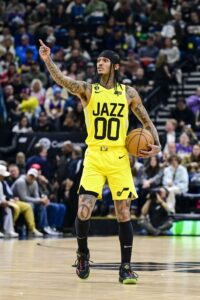 Clarkson is expected to decline his player option to land a long-term contract in free agency, which makes a lot of sense. He’s averaging career highs in points (20.8) and assists (4.4) per game and has matched his career best in rebounds per night (4.0) while posting a .444/.338/.816 shooting slash line (.558 true shooting percentage).
Clarkson is expected to decline his player option to land a long-term contract in free agency, which makes a lot of sense. He’s averaging career highs in points (20.8) and assists (4.4) per game and has matched his career best in rebounds per night (4.0) while posting a .444/.338/.816 shooting slash line (.558 true shooting percentage).
The veteran guard will turn 31 years old in the offseason, so this might be his last chance to land a major multiyear payday. He is an all-around poor defensive player, but his play-making has improved this season, and his shot-creation ability is widely coveted.
I don’t have a great feel for how much Clarkson might get in free agency. His representatives could point to the contracts signed by Anfernee Simons (four years, $100MM) and Jordan Poole (four years, $123MM guaranteed) last summer, for example – Clarkson is much older and has less upside, but his strengths, weaknesses and production are fairly similar to those players.
If I were a GM, I would be very hesitant to pay Clarkson that much money, but he has earned a raise on his current deal, that much is certain.
Udoka Azubuike, C, Jazz
- 2022/23: $2.17MM
- 2023/24: UFA
- Stock: Down
A former first-round pick (No. 27 overall in 2020), Azubuike has unfortunately dealt with a few significant ankle injuries in his brief NBA career, which has impacted his development. Utah declined its fourth-year team option on the 23-year-old big man before the season started, sending a strong signal that he wasn’t in the team’s long-term plans.
Azubuike has only appeared in 26 games this season for an average of 5.9 minutes per contest. It’s hard to get much of a read on someone who plays so little, but he is a limited offensive player who struggles at the free throw line (he shot 41.6% in four college seasons and is at 55.2% on very low volume in the NBA).
The remaining 17 games will essentially serve as an audition for Azubuike. How he performs — and if he gets minutes — could very well determine whether or not he’s able to land a guaranteed contract in the offseason. The odds of that happening seem lower than 50/50 at the moment.
Naz Reid, C, Timberwolves
- 2022/23: $1.93MM
- 2023/24: UFA
- Stock: Up
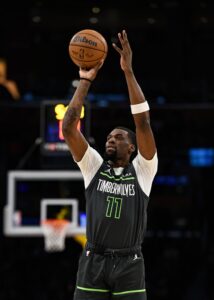 Reid’s per 36 numbers have been quite consistent in each of his four seasons. So why is his stock up?
Reid’s per 36 numbers have been quite consistent in each of his four seasons. So why is his stock up?
The primary reason is he’s shown that his game is scalable, meaning his production doesn’t suffer with more playing time. The 23-year-old is averaging 16.5 points, 7.0 rebounds, 1.4 steals and 1.0 block in 11 games as a fill-in starter (26.1 minutes), with the team going 6-5 in those contests. Playing well against reserves is one thing, but doing it over the course of a full game against starters is something entirely different.
Reid has slimmed down considerably since going undrafted out of LSU in 2019 and has shown that he is a quality backup center capable of spot starts. Something in the range of $8-11MM annually seems within reach — a massive increase on his current minimum-salary contract.
Jaylen Nowell, G, Timberwolves
- 2022/23: $1.93MM
- 2023/24: UFA
- Stock: Down
I liked what I saw from Nowell last season and thought he should have gotten more minutes at times. He is shifty with the ball with a quick first step, and shows some nascent play-making ability.
Something has been off with him for nearly the entire ‘22/23 season, which is unfortunate because he had a big opportunity to establish himself after the Rudy Gobert trade freed up backcourt playing time.
Maybe that’s part of the problem. He often looks like he’s trying too hard and forcing the issue instead of letting the game come to him, often a sign of a player pressing. The steep decline in three-point shooting — from 39.4% last season to 29.3% in ‘22/23 — looks like another mental hurdle, as he hesitates at times even when he’s wide open, instead of trusting himself and letting it fly.
Nowell is only 23 and on a minimum deal. He will get more than that in free agency, but probably not as much as he was aiming for before the season began.
Drew Eubanks, C, Trail Blazers
- 2022/23: $1.84MM
- 2023/24: UFA
- Stock: Up
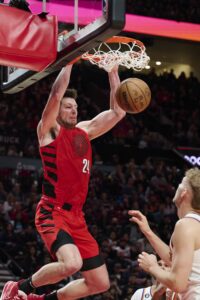 Another player on a minimum-salary deal, Eubanks plays within a clearly defined, limited offensive role of setting hard screens, rolling for the occasional lob, and crashing the offensive glass. His averages of 6.1 points, 5.1 rebounds and 1.2 blocks don’t exactly jump off the page, though he is shooting an impressive 68.3% from the field through 62 games (19 starts, 19.9 minutes).
Another player on a minimum-salary deal, Eubanks plays within a clearly defined, limited offensive role of setting hard screens, rolling for the occasional lob, and crashing the offensive glass. His averages of 6.1 points, 5.1 rebounds and 1.2 blocks don’t exactly jump off the page, though he is shooting an impressive 68.3% from the field through 62 games (19 starts, 19.9 minutes).
However, he is an above-average defensive player who moves his feet well for a big man, allowing him to switch onto smaller players better than most centers. The 26-year-old is also a solid rim protector, making up for his relative lack of height (he’s 6’9”) with powerful leaping ability and solid timing while challenging and blocking shots.
Eubanks isn’t the type of player who is going to land a major payday in free agency, but I do think he’s solidified himself as a quality backup due to his consistent energy and the self-awareness he brings of knowing his role. The Blazers have been better when he’s on the court, which is always a positive sign. A multiyear deal in the range of $4-7MM per season seems pretty reasonable.
11:07am: Dunn’s second 10-day deal with the Jazz is now official, per NBA.com’s transaction log. It will cover Utah’s next five games.
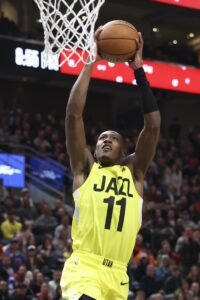 7:09am: Kris Dunn‘s 10-day contract with the Jazz expired after Friday’s game, but the veteran guard isn’t going anywhere. Utah intends to sign Dunn to a second 10-day deal, sources with knowledge of the situation tell Sarah Todd of The Deseret News (Twitter link).
7:09am: Kris Dunn‘s 10-day contract with the Jazz expired after Friday’s game, but the veteran guard isn’t going anywhere. Utah intends to sign Dunn to a second 10-day deal, sources with knowledge of the situation tell Sarah Todd of The Deseret News (Twitter link).
Dunn, who joined the Jazz following a stint in the G League, immediately claimed a spot in the rotation during his first 10 days with his new team, helping to fill in for injured guards Collin Sexton and Jordan Clarkson.
The former fifth overall pick averaged 12.0 points, 4.5 assists, 3.8 rebounds, and 2.0 assists in 22.3 minutes per night across four appearances. A career 42.0% shooter from the floor entering this season, Dunn has scored more efficiently in his first few games in Utah, making 52.5% of his field goal attempts.
A player is permitted to sign up to two 10-day contracts with the same team in a given season, so at the end of his second 10-day deal, Utah will have to decide whether to sign Dunn for the rest of the season or let him walk.
Frank Jackson‘s 10-day contract with the Jazz also expired following Friday’s game, but the team’s plans for him aren’t yet clear. Unlike Dunn, Jackson didn’t play a regular role on his first 10-day deal, logging just five minutes in a single appearance.
Even after re-signing Dunn, Utah will have two openings on its 15-man roster, giving the club plenty of flexibility to audition other players 10 days at a time.
- Are the Jazz in officially in tank mode? Andy Larsen of The Salt Lake Tribune explored that question following Tuesday’s loss to San Antonio, arguing that Utah’s injury report and rotation decisions certainly suggested the team wasn’t going all-out to win.
Jazz center Walker Kessler and Magic forward Paolo Banchero have been named the NBA’s rookies of the month, the league announced on Thursday (via Twitter).
In 11 February games (29.1 MPG), Kessler, the No. 22 overall pick of last year’s draft, averaged 10.6 PPG, 11.4 RPG and 3.2 BPG while shooting 68.9% from the floor and 51.9% from the line. The 21-year-old ranks second in the league in block percentage at 8.2%, only trailing Jaren Jackson Jr., per Basketball-Reference.com. Kessler won for the Western Conference.
Banchero, the No. 1 overall pick of the 2022 draft, has now won the award three consecutive months for the East. He averaged 16.6 PPG, 7.5 RPG and 3.3 APG, though he did struggle with scoring efficiency, posting a .374/.030/.711 shooting line in 11 games (33.7 MPG). Banchero is considered a strong frontrunner for Rookie of the Year.
According to the NBA (Twitter link), the other nominees in the West were Malaki Branham, Tari Eason, Jabari Smith Jr., Keegan Murray and Jalen Williams, while Jaden Ivey and Bennedict Mathurin were nominated in the East.
Jae Crowder has no regrets about his holdout in Phoenix or the months of missed games as he waited for a trade to be completed, telling Michael Scotto of HoopsHype, “I’d do it all over again.”
The Bucks had been considered among the favorites to land Crowder, but they weren’t able to work out a deal directly with the Suns. After Phoenix agreed to ship Crowder to Brooklyn in the Kevin Durant trade, Milwaukee offered draft assets to the Nets and everything was folded into a four-team deal.
The Bucks were thrilled to finally obtain Crowder, and they see him filling the defensive specialist role that P.J. Tucker did during their championship run in 2021. He has fit in seamlessly so far, averaging 19.3 minutes off the bench as Milwaukee has gone 4-0 since he has arrived.
“I think this team has what it takes to win a championship,” Crowder said. “That’s my main goal right now. I think once you win a championship, the rest of that stuff will take care of itself. My main goal, honestly, is not thinking about free agency or the summer. It’s all about winning the championship. I think that’s our locker room goal, and when I came into it, I knew that was the goal of the team.”
Crowder’s relationship with the Suns was reportedly damaged beyond repair when head coach Monty Williams informed him last offseason that he would no longer be a starter. Crowder refused to report to training camp, opting for individual workouts twice each day while he waited for a trade to materialize.
Sources tell Scotto that even when Cameron Johnson tore his meniscus in November, Crowder never considered returning to the Suns and the team didn’t discuss asking him to come back.
“Nah, there wasn’t a chance I was going to play there,” Crowder said. “Both sides knew that the road had come to an end. That came to an end way before Cam got hurt. I wasn’t going back on it, and they weren’t going back on it.”
Phoenix received offers for Crowder from several teams, Scotto adds. The Hawks, Rockets and Suns had exploratory discussions that would have sent Crowder to Atlanta along with Landry Shamet, while Eric Gordon and Kenyon Martin Jr. would have gone to Phoenix and John Collins would have wound up in Houston, but Scotto’s sources say that deal was never close to being completed.
Scotto adds that the Hawks also attempted to acquire Crowder and Shamet in a three-way trade that would have included the Jazz, but a disagreement over the draft picks Utah would have received prevented the teams from making progress. Jarred Vanderbilt and Malik Beasley would have gone to the Suns in that version of the deal.
This is the fourth entry in our series breaking down the significant trades of the 2022/23 season. As opposed to giving out grades, this series explores why the teams were motivated to make the moves. Let’s dive into a blockbuster deal between the Jazz, Lakers and Timberwolves.
On February 9, the Lakers acquired D’Angelo Russell, Malik Beasley and Jarred Vanderbilt; the Jazz acquired Russell Westbrook, Damian Jones, Juan Toscano-Anderson and the Lakers’ 2027 first-round pick (top-four protected); and the Timberwolves acquired Mike Conley, Nickeil Alexander-Walker, and three second-round picks (one from L.A., two from Utah).
Notes: Westbrook subsequently reached a buyout agreement with the Jazz and signed with the Clippers. All three teams involved in this deal generated traded player exceptions, which can be found right here.
The Jazz’s perspective:
The Jazz weren’t invested in continuing the season with their current roster, despite a surprisingly fun ride in a year that they were expected to be at the bottom of the standings.
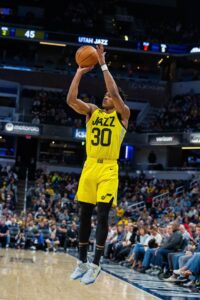 The move opened up playing time for Ochai Agbaji, Collin Sexton and Talen Horton-Tucker, three young players who had been in and out of the lineup (Sexton has been a rotation regular, but he’s dealt with injuries – this deal moved him into the starting lineup). Vanderbilt had already been moved to the bench due to the emergence of Walker Kessler, and the two were an awkward fit together offensively because neither is much of a threat to shoot (Vanderbilt compensates for his lack of shooting somewhat by being a good passer and ball-handler for a power forward).
The move opened up playing time for Ochai Agbaji, Collin Sexton and Talen Horton-Tucker, three young players who had been in and out of the lineup (Sexton has been a rotation regular, but he’s dealt with injuries – this deal moved him into the starting lineup). Vanderbilt had already been moved to the bench due to the emergence of Walker Kessler, and the two were an awkward fit together offensively because neither is much of a threat to shoot (Vanderbilt compensates for his lack of shooting somewhat by being a good passer and ball-handler for a power forward).
Many fans think the Jazz “lost” this deal. That perception seems to stem from two things: the Lakers only giving up one first-rounder, when it was assumed they’d have to move off one just to trade Westbrook’s $47.1MM expiring salary, and the Jazz’s asking prices not being met.
The Jazz were reportedly looking for first-round picks for all three of Conley, Beasley and Vanderbilt. But that was never a realistic expectation.
Based on the structure of the deal, it’s pretty clear the Jazz were motivated to move off Conley’s contract for ‘23/24, which is partially guaranteed at $14.32MM ($24.36MM base salary), and didn’t at all mind adding Westbrook’s expiring deal to do it (it’s worth noting that the Jazz did add Jones’ $2.6MM player option for next season, which will almost certainly be exercised; Toscano-Anderson is on an expiring minimum-salary deal). I viewed Conley’s contract as having negative value leading up to the trade deadline, as he’ll turn 36 years old next season and has already declined on both ends of the court, particularly defensively.
Beasley provides something that every team wants: high volume 3-point shooting. However, he’s a very streaky shooter, and doesn’t offer a ton in other areas. He makes $15.56MM this season with a $16.52MM team option for ‘23/24. I thought Beasley had slightly positive value, but nothing special – maybe a heavily-protected first-round pick or a few seconds.
Vanderbilt was the player who had the most value of the three, in my opinion, due to his age (23), rate of improvement, versatility, strong defense, and team-friendly contract – he makes $4.37MM this season and $4.7MM in ‘23/24 (only partially guaranteed at $300K). I thought Utah could get a late first-rounder this season or a lottery-protected first in the future for him.
In aggregate, that’s one player with solid value, one with slightly positive value, and one with negative. Not a ton of overall value despite the three being rotation players for a decent team.
Obviously, the Jazz highly valued the lightly protected pick from the Lakers. Even in a scenario where the Lakers have the worst record in ’26/27 (they probably won’t, but you never know), there would still be a 47.9% chance the pick lands at fifth overall and goes to Utah. The major downside – and the upside for the Lakers – is if it does fall in the top four, the Jazz only receive the Lakers’ 2027 second-rounder.
Another factor in this trade from Utah’s side of things that I thought was interesting is also pretty cynical. If the Jazz believe Minnesota going from Russell to Conley is a downgrade — and it is at this point in their careers, which is why the Wolves got second-rounders back — then that increases the odds of the Wolves missing the playoffs. In that scenario, the Jazz would get a lottery pick in 2023 (they control Minnesota’s pick due to the Rudy Gobert trade).
They could also reasonably view the deal as a short-term upgrade for the Lakers, which would increase L.A.’s odds of passing Minnesota and Utah in the standings, and thus increase the odds of the Jazz controlling two lottery picks. For the rest of the season, the better the Lakers do and the worse the Wolves and Jazz do, the better it is for the Jazz as far as those first-rounders go.
The Jazz held out for a long time to get the best deal they could. This turned out to be it.
The Lakers’ perspective:
I think the Lakers made out well in this deal, but it did reduce their draft arsenal to go for a star in the future (that may or may not have been realistic). Still, they upgraded their roster, got younger, and the players make sense for what they need.
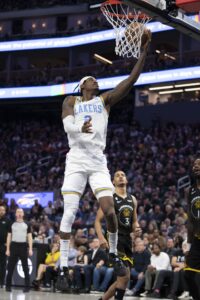 Los Angeles replaced one player who was a poor fit and two little-used reserves for three potential starters; at worst they’re rotation regulars. None of the outgoing players were shooters, and they picked up a couple pretty good ones.
Los Angeles replaced one player who was a poor fit and two little-used reserves for three potential starters; at worst they’re rotation regulars. None of the outgoing players were shooters, and they picked up a couple pretty good ones.
Russell, 27, is having a strong year from an efficiency standpoint, shooting career highs from all over the court (54.3% on twos, 38.9% on threes, 85.0% from the line). However, he is not a great rebounder or defender, and his decision-making can be questionable as a lead ball-handler.
That’s less of a concern with the Lakers, as he can play alongside James and/or Dennis Schroder. That allows Russell to function both on and off the ball, which is ideal for his skill set. Unfortunately, he sprained his ankle in his fourth game back with Los Angeles, but the injury isn’t considered a long-term concern.
As I’ve mentioned previously, Beasley is a feast-or-famine type shooter who can go off at any given time. It’s a bit of roller coaster ride watching him from game-to-game because you never know if he’s going to be on that day or not, and he doesn’t stop shooting even if he’s off.
While he doesn’t provide a whole lot else, opponents treat the 26-year-old like a sharpshooter who has to be accounted for at all times, and that creates space for teammates. The Lakers didn’t have anyone like that on the roster before the deal, even if Beasley is more of a very willing good shooter than a great one.
Vanderbilt is the player I think fans will be most excited about of the three, despite being the least well known. He brings a much-needed infusion of speed, length, defensive versatility, hustle and rebounding the team has lacked all season.
Still just 23 years old, Vanderbilt instantly becomes the best wing defender the Lakers have had since they decided not to re-sign Alex Caruso in 2021 free agency. His energy is infectious and can swing the tide of games – he was absolutely instrumental in the team’s huge comeback victory over Dallas on Sunday.
The three players were teammates on the Wolves from 2020-22, so they already have some built-in chemistry (strangely, Beasley and Vanderbilt have now been packaged together in three separate trades). Only Vanderbilt has a small partial guarantee for next season, which gives the Lakers the flexibility to move on from any of them in the offseason, though I think that’s unlikely.
Another positive aspect of the deal is the Lakers added more desirable contracts. Almost their entire roster was on minimum- or maximum-salary deals before the deadline, but now they have more variety in that regard, assuming they retain all three players.
I don’t think this trade suddenly transformed the Lakers into title contenders this season, but I do think it made them much better than they were — now and going forward.
My biggest question mark from the Lakers’ side is, if this trade was available in February, could they have done it earlier in the season? Because they have to dig themselves out of a hole to climb up the standings, and there aren’t many games left in which to do it – a task made even more difficult by the foot injury to James.
The Wolves’ perspective:
One of the downsides of dealing away multiple starters at once — Patrick Beverley and Vanderbilt last year in the Gobert trade — is that it can erode a team’s chemistry. The Wolves clearly got on well last season. That matters for a young team, especially one that historically has been a bottom dweller in the standings.
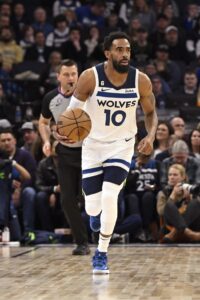 The Gobert trade upended that chemistry, transforming a fun up-and-coming team with low expectations into a win-now team with high expectations. It’s pretty clear some of the remaining players were less than thrilled with the deal, especially at the start of ‘22/23. Some moved on and slowly learned how to work with Gobert. Some did not.
The Gobert trade upended that chemistry, transforming a fun up-and-coming team with low expectations into a win-now team with high expectations. It’s pretty clear some of the remaining players were less than thrilled with the deal, especially at the start of ‘22/23. Some moved on and slowly learned how to work with Gobert. Some did not.
Russell was in the latter group. He frequently had terrible body language this season, specifically anytime Gobert made a mistake (fumbled passes, etc.).
Perhaps more than anything else, this deal was a pretty clear vote of no confidence in Russell. Obviously, the Wolves did not value him at whatever he was asking for in contract extension negotiations.
The Wolves could not have easily cleared a significant amount of cap space in the offseason even if they had let Russell walk in free agency. Instead, they decided to push that decision a year down the line and replace his salary slot with Conley, a mature veteran who should be able to provide leadership for a team that, from the outside looking in, is lacking in that department.
Minnesota is trying to remedy some of the chemistry issues by adding a calming, professional locker-room presence in Conley. The fact that Conley played with Gobert for three seasons was obviously a motivating factor as well. They already have some built-in chemistry, which was clearly lacking with Russell.
He’s also a much better decision-maker than Russell on the court, with his assist-to-turnover ratio at 4.4-to-1, which ranks fifth in the NBA (Russell’s is 2.31-to-1, which ranks 112th). That’s important for a Wolves team that ranks 28th in the league in turnovers per game.
I have a lot of respect for how Conley carries himself, both on and off the court. He was one of the league’s most underrated players during his 12 years with Memphis, and his teams have consistently been better when he’s playing — that was true for Utah this year too (better on offense and worse on defense, but still plus overall). He has a high basketball IQ and generally doesn’t beat himself with careless mistakes.
Alexander-Walker was likely more of a throw-in for salary-matching purposes, but the Wolves will get a closer look at him for the rest of the season (he can be a RFA if they give him a qualifying offer). The former 17th overall pick is having a solid year from an efficiency standpoint and has impressed me in some late-game situations with his defense, even if he wasn’t consistently in Utah’s rotation.
While I understand the logic behind the move from Minnesota’s side of the deal, I also think the Wolves took on the most short- and long-term risk.
Make no mistake, the Wolves knew this was was a downgrade from a production standpoint — that’s why they got back three second-round picks in the deal. Considering his age, size (6’1″, 175 pounds) and contract, if Conley declines any further, it will be very difficult to move him next season.
Russell may have his flaws, but he was also clutch this season, having bailed them out on several occasions during second-half collapses (a season-long problem). He was the team’s second-leading scorer with Karl-Anthony Towns sidelined for most of the season, and removing him from the equation puts a lot of pressure on the rest of the roster to replace Russell’s scoring – the Wolves are just 21st in the league in offensive rating.
The early returns haven’t been promising. Minnesota has gone 1-4 since the deal was finalized, though in fairness some key rotation players have been in and out of the lineup.
The key takeaway from the Wolves’ end is that they preferred to get something back for Russell rather than losing him for nothing in free agency. Not wanting to make a significant investment in Russell makes sense to me if they didn’t view him as a long-term fit. Still, if they miss the playoffs and the Jazz get extremely lucky and that pick lands early, it would be an unmitigated disaster for Minnesota.
- Jazz guard Collin Sexton will remain on the shelf for at least one more week due to his left hamstring strain, tweets Andy Larsen of The Salt Lake Tribune. The team stated that Sexton is “progressing as expected” and will be reevaluated next Monday. His backcourt mate Jordan Clarkson has also been added to the injury list and will miss Tuesday’s game with a sprained right thumb, tweets Larsen.
- Kris Dunn is making an immediate impact for the Jazz after they signed him to a 10-day contract, according to Andy Larsen of The Salt Lake Tribune (subscriber link). After notching 11 points, one rebound, one assist and two steals in 16 minutes in his Jazz debut versus Oklahoma City, Dunn followed that up with 15 points, eight assists, seven boards, one steal and one block in 23 minutes versus San Antonio. Utah was victorious in both efforts, with Larsen saying the veteran guard was arguably the team’s second-best player against the Spurs on Saturday.
The Jazz won’t seek any compensation from Atlanta if the Hawks move forward with Quin Snyder and hire him as their new head coach, reports Eric Walden of The Salt Lake Tribune.
As Walden explains, Snyder technically resigned from his position as the Jazz’s head coach last June rather than being fired. Because Atlanta may hire Snyder before his contract with Utah would have expired, the Jazz would be entitled to seek compensation in the form of draft assets or cash before allowing him to officially join the Hawks.
However, according to Walden’s source, the Jazz are comfortable with simply severing ties with Snyder and allowing him to accept whichever job best suits him without holding up the process.